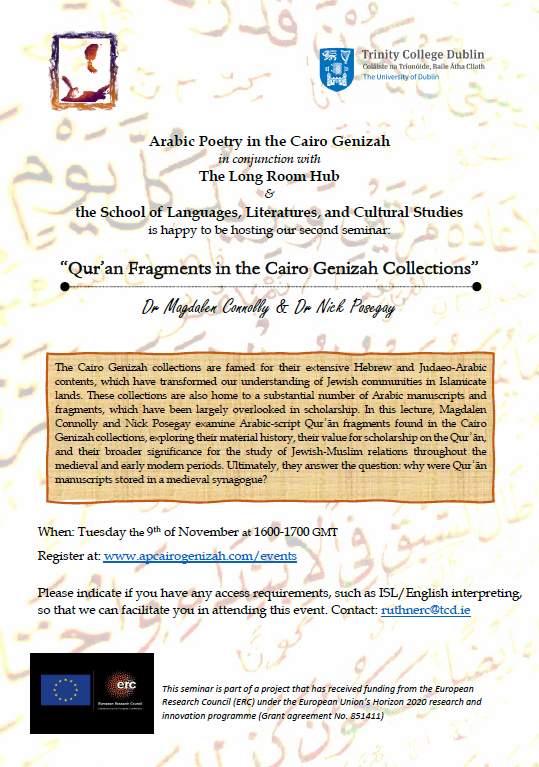Events
Throughout the course of our project, we will be hosting an on-going seminar series, conferences, and exhibitions. Below, you will find information on these events.
APCG Lecture Series
Seminar II: Dr Magdalen Connolly and Dr Nick Posegay (Cambridge)

Qurʾān Fragments in the Cairo Genizah Collections
Dr Connolly's and Dr Posegay's lecture examines Arabic-script Qurʾān fragments found in the Cairo Genizah collections, exploring their material history, their value for scholarship on the Qurʾān, and their broader significance for the study of Jewish-Muslim relations throughout the medieval and early modern periods. Ultimately, they answer the question: why were Qurʾān manuscripts stored in a medieval synagogue?
Seminar I: Dr Rachel Hasson (Hebrew University in Jerusalem)

Popular Literature Found in the Genizah--Between Originality to Adaption
Dr Hasson's lecture focuses on the popular literature found in the genizah. Particularly, the literature in question is written in Judeao-Arabic. The texts are diverse, and the origins of them span across the different cultures in the Mediterranean basin.
Stay tuned for more information on our upcoming exhibitions!
Conferences
Call for abstracts!
ARABIC POETRY IN THE CAIRO GENIZAH is seeking abstracts for our workshop:
History and Anthropology Through Literature:
APPROACHES AND METHODOLOGIES TO THE STUDY OF MEDIEVAL AND MODERN TEXTS AND MANUSCRIPTS
July 2022 @ Trinity College Dublin, Ireland
The Cairo Genizah is a treasure trove of medieval and early-modern manuscripts stored away in Egypt’s Ben Ezra Synagogue over nearly a thousand years. All manner of written texts, from lost works of Jewish literary legend to the mundane ephemera of everyday life have been found there. Until recently, however, there has been comparatively little focus on the Arabic literary manuscripts of the Genizah, particularly its poetry. These fragments of literary history are fascinating insights into the multicultural Cairo cosmopolis, demonstrating a rich cultural exchange through the literature, as well as their Hebrew-Arabic transcriptions. But the study of these texts poses challenges in understanding Jewish life and Jewish-Arabic relations in Islamic lands. On the one hand, it seems self-evident that Arabic poetry had a tremendous influence on the culture of the Jews of the Genizah world, as so many Arabic poems are found in the Genizah. But on the other hand, some manuscripts contain just small excerpts from much larger or epic Arabic poetical works. To what extent can we say this is an instance of artistic exchange? Or perhaps it is the case that such excerpts become adages, common currency of Cairene culture? How do we investigate the nuances of pre-modern manuscripts in such a cosmopolitan atmosphere, whilst maintaining authentic translation and linguistic analysis? How might the study of such texts – their creation, their copying, their circulation, and their reuse – shed light on the Arabic and Jewish communities, their communal interrelations and shared experience of cultural life?
This one-day workshop seeks to bring together scholars of various disciplines, including, but not limited to, manuscript sciences, history, anthropology, literary criticism, philosophy, and sociology for an exciting workshop on emerging approaches and challenges to the investigation of history, sociology, and anthropology though pre-modern literature and its manuscripts.
If you would be interested in taking part and giving a paper, then please send us an abstract of 300-800 words, with your approach to the workshop theme. Abstracts related to the following topics are particularly encouraged to apply:
- How the study of medieval/modern literary manuscripts/texts can reveal social and cultural history, if at all?
- How does the historical study of literature help us to understand the social dynamics of a certain community or nation?
- How important is the study of authorship to the study of readers of the past?
- What gaps can literature fill in our study of historical communities?
- To what extent do genre, literary form, and language obscure or enhance the historical value of literary texts?
- Given that Jewish writers are borrowing forms and language from the Arabicised world around them, can we treat them as reliable sources for the contemporary Jewish social and intellectual world? And, moreover, can we use them to gain insight into the wider intellectual milieu of the medieval Mediterranean?
- As the historian John Tosh suggests, the more successful an author, the more ‘he or she articulates the values and preoccupations of literary contemporaries’. Should we be giving more historical weight to the better-known figures among the fragments, or does value lie also in the more obscure writers too?
- Given that much of the Genizah material is undated and of potentially wide geographical provenance, what codicological or literary clues might there be that can help locate them in a historical time and place?
Please submit two documents, an Abstract with CV by February 1st 2022 with the subject ‘APCG Abstract Submission’ to:
Ben Outhwaite: bmo10@cam.ac.uk and Mohamed Ahmed: ahmedm4@tcd.ie
Authors will be notified by March 1st 2022. Successful candidates will receive a bursary toward their travel costs and accommodation for two nights. Should you wish to participate online, please let us know in your submission email.
For more information, please contact Raymond Davidson: rdavidso@tcd.ie
